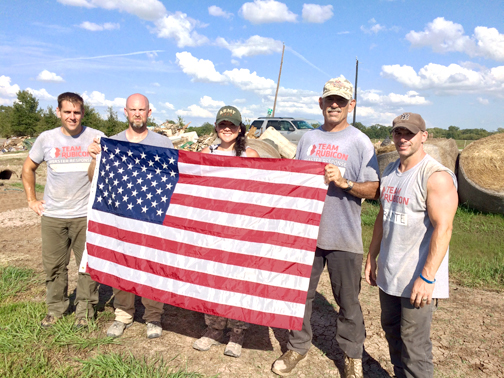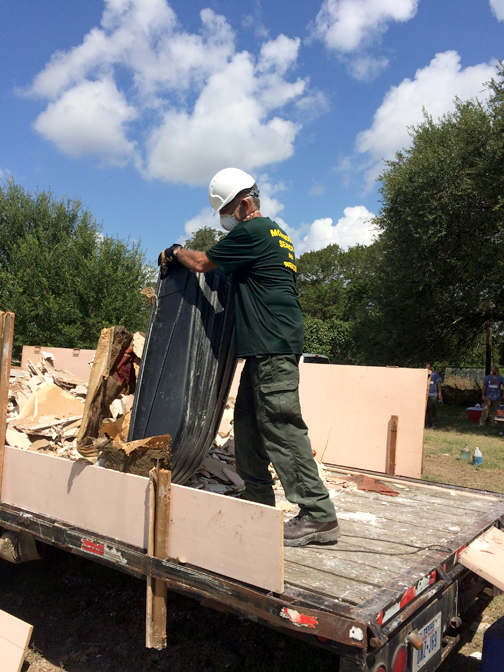
Main Team: Team Rubicon surrounds a Texas church sign thanking team members for their tireless work helping to rebuild the town.
“Service to others is the rent you pay for your room here on Earth.” Muhammad Ali
By Mary O’KEEFE
For some, sitting back when help is needed is simply not an option. Mike Leum is a member of the Montrose Search and Rescue team and a leader with Life Rolls On/They Will Surf Again. He understands the importance of giving his time to help others and, for those who know him, this service to others is a calling … a loud, continuous call that he is compelled to answer. So when he got the call from Team Rubicon to fly to Texas after Hurricane Harvey slammed into the state he went without hesitation.
Leum had signed up for Team Rubicon before Harvey hit. To join the team there was a process that he undertook that included online training, including courses required by FEMA (Federal Emergency Management Agency), and a background check.
“Once you’re approved, they issue you a number and they will send out notifications [of when you are needed],” Leum said.
Team Rubicon was formed in 2010 when a magnitude 7.0 earthquake hit Port-Au-Prince, Haiti. The call for help was made and two U.S. Marines, Jake Wood and William McNulty, knew they could help. They, along with six other veterans, gathered funds and supplies and flew to the Dominican Republic where they rented a truck and headed to Haiti, according to teamrubiconusa.org.
Team Rubicon has response teams in regions throughout the United States and will go anywhere they are needed. Their current operations, according to their website, are in Houston, Texas helping with Hurricane Harvey relief and in Jacksonville, Florida cleaning up after Hurricane Irma.
Leum has extensive training through MSAR and knew he could put that training to use in areas outside of California. At present, the Los Angeles County Sheriff’s Dept., the agency the search and rescue teams work under, does not have teams that travel to other states when disasters hit.
“As an MSAR member, my visceral response is, ‘I want to help people,’” Leum said. “As a member of Team Rubicon, I received the request to deploy to Texas.”
The organization covers the cost for team members, including travel, lodging and food.
“All you have to do is show up and work your butt off,” Leum said.
And work he did.
“I can’t ever remember working so hard,” he joked.
The work, although rewarding, was never ending because Hurricane Harvey had devastated the houses, buildings and landscape. A lot of the efforts were focused on veterans, the elderly and disabled. The teams went into homes that had been underwater and tore down walls, ripped up flooring and dealt with a lot of mold.
“Our first assignment was in Harris County,” Leum said.
He was assigned as strike team leader and got his first real view of how bad the water damage was to these Texas homes. A couple of days later, Team Rubicon was deployed to Wharton, Texas. Images of Wharton show how Harvey’s flooding covered the land. This time, Leum was made chief safety officer in charge of medical response, but was still on a mobile strike team.
Every day he worked alongside fellow members of Team Rubicon, most of them military veterans. They formed a tight bond that continues today.
“Two team members were from Maryland,” he said. “[Team members] came from all over the country.”
He said it was the best of all worlds; they were all working together with one goal of helping others and formed a great camaraderie.
“The most impactful part of my deployment was seeing the attitude of these people who had lost everything,” Leum said. He spoke of people who had lost everything in their home and were still so grateful for the help and to just be alive.
“There was this one 85-year-old guy we were helping. He didn’t have any family [his wife and daughter had passed away years prior], and he was staying at a friend’s home 60 miles away,” he said.
The man would travel to his home and be there with those who were tearing down the walls and cleaning his house.
“He said he felt blessed that ‘you all are here,’” Leum said.
Another Korean War POW (prisoner of war) veteran whose home had been damaged was there every day, and on Sunday he held a church service in the yard.
“It was amazing to see the resiliency of people just picking themselves up and moving on,” Leum said.
It was also uplifting to see so many people helping, those who had come from all over the country and then Texans helping Texans. Leum said Team Rubicon was very organized and connected with church communities. It was these communities that supplied breakfast and lunch for the team.
What he saw and learned in Texas he said he can use when the earthquake, and other disasters, hit closer to home.
“I guess it is similar to an earthquake. It is going to be a long, long time before these areas are back to normal. These counties are not ready to deal with so much debris removal,” he said.
Leum said residents shared many hurricane stories, including stories of cattle floating away, and some found in trees as the water receded.
“There were chain-link fences mowed down by the force of water,” he said.
There were ponds everywhere that had just popped up.
“We saw some people fishing in those ponds because the fish had floated from rivers,” he said.
There were a lot of hazardous conditions besides the mold that covered everything. There were snakes that were caught in the water and ended up in the walls of some the houses and the fields where cattle once stood that were flooded, allowing their waste to spread as the floodwaters rose.
Leum was in Texas for a week and, on the way back to California, was contacted by Team Rubicon to go to Mexico after its earthquake. They requested a two-week deployment, which he could not do.
“But I am going back for future operations,” he said.
Leum is used to search and rescue where saving lives is the goal. But it wasn’t about that in Texas.
“[It] wasn’t life saving, but I would consider it life restoring, which can be just as meaningful when you’re the recipient,” he said. “And no one cared about politics, religion or [differences]…. It was neighbors taking care of neighbors.”




